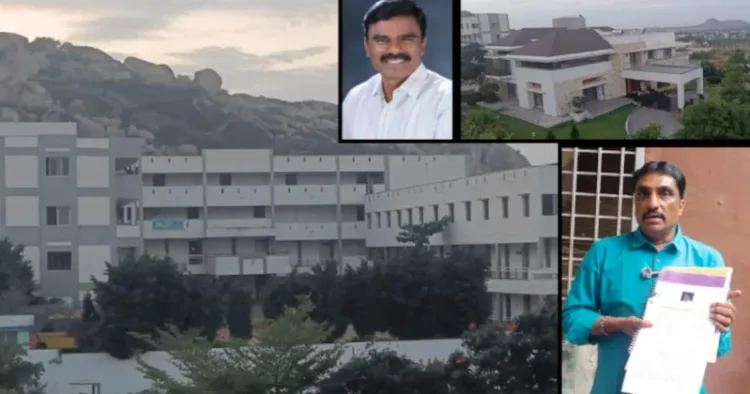In a shocking revelation, N.R. Ramesh, social activist and a prominent leader of the Bharatiya Janata Party (BJP), has brought forth grave allegations against Anwar Basha, the chairman of the Karnataka State Waqf Board. Ramesh has accused Basha of illegally appropriating more than Rs. 10 crores worth of property that was initially earmarked for the Muslim community’s crematorium in Agasanakallu village, Chitradurga. This land, consisting of 6 acres, was sanctioned by a government notification dating back to March 31, 1987, by the then Special Deputy Commissioner.
In a press conference aimed at shedding light on the issue, Ramesh highlighted the apparent misuse of power by Anwar Basha, noting that the Waqf Board chairman has not only infringed on this property, which belongs to the community but has also transformed it for his personal use. The property, officially designated as a cemetery, has allegedly been converted into a site for a private school building and a luxurious bungalow for his residence.
Ramesh’s accusations are not merely anecdotal but backed by documentation presented to the Lokayukta department. He likened the situation to the age-old proverb: “It is like grazing the field by raising the fence,” emphasising the betrayal of trust and responsibility exhibited by Basha, who is supposed to serve the community but is, instead, exploiting it.
Irregularities and Legal Violations
The complaint centres around Survey No. 11 of Agasanakallu village in the Kasaba Hobli area of Chitradurga Taluk. According to Ramesh, Anwar Basha has illegally reclassified this land as new Survey No. 25. This reclassification has enabled the chairman to illegitimately claim the property, thus acting against the spirit of the Central Waqf Board Act of 1923, which explicitly protects properties like graveyards, mosques, and dargahs as assets of the Waqf Board.
“The regulations are in place for a reason,” Ramesh stated, asserting that the actions of Basha and his collaborators within the Waqf Board violate legal statutes and undermine community trust. “The resources meant to serve the community are being misused for personal gain by those we expect to uphold and protect them. This is a betrayal on multiple levels.”
Community Outcry and Demands for Accountability
Ramesh is not alone in his pursuit of justice. The local Muslim community is also expressing outrage over these developments. Many call for immediate legal action against those involved in this scandal, particularly Basha and the officials who allegedly facilitated this land grab by turning a blind eye to the illegal activities.
“Communal harmony cannot be established when there is deep-rooted corruption and fraud within crucial community organisations,” stated a concerned local Muslim who remained anonymous. Others echoed similar sentiments, indicating a desire for accountability and transparency within the Waqf Board and local governance.
Government Involvement
Ramesh has called upon Karnataka’s Chief Minister, Siddaramaiah, to intervene and initiate a thorough investigation. He urged the state government to reclaim the encroached property and hold all individuals accountable for this act of land grabbing. Ramesh stated, “The Chief Minister must take strict legal action against Anwar Basha and the Waqf Board officials assisting him in this heinous crime against the community.”
He also reaffirmed his commitment to ensuring justice, claiming that the community is united in demanding accountability and proper action from the state government. “We will not let this issue fade into the background. We will keep the fire of justice burning until those responsible are held accountable,” he said emphatically.
The Path Forward: Legal Actions and Community Solidarity
To back his claims, Ramesh has filed a detailed complaint with the Lokayukta, urging officials to investigate cases of land grabbing, abuse of power, and forgery linked to Basha and his accomplices. He has provided comprehensive documentation that outlines the irregularities surrounding the land’s appropriation.
Within the wider context, this situation raises critical questions about governance, oversight, and accountability in organisations meant to serve the community. Activists and political leaders have increasingly called for reforms to enhance transparency and protect communal resources.
The need for a robust mechanism to monitor the functions of the Waqf Board and prevent similar occurrences in the future has become a rallying point for concerned citizens. Many believe improved regulation and oversight could help safeguard community assets against potential misuse and dead-end corruption.
The allegations against Anwar Basha, as articulated by BJP leader N.R. Ramesh, underscore significant concerns about governance within the Karnataka State Waqf Board. Incidents like these threaten public trust and the principles of justice and equity that should underpin community organisations.
As more details of this unfolding story emerge, it will be imperative for local authorities and the government to address these claims seriously. The consequences of inaction may set dangerous precedents, eroding community trust and exacerbating social tensions.
The community stands united in demanding justice, accountability, and action from the authorities to ensure that such incidents do not recur in the future. The spotlight now turns to the Lokayukta and the Chief Minister’s office as all await a response to these serious allegations of land grabbing and misconduct within a state institution. The outcome of this matter could very well shape the future of governance and community relations in Chitradurga and beyond.



















Comments